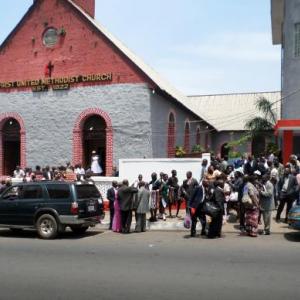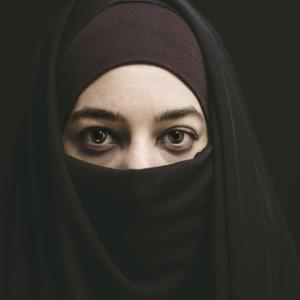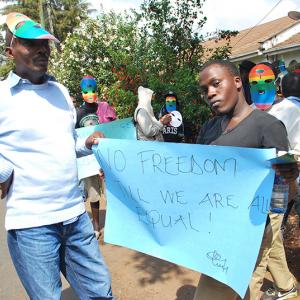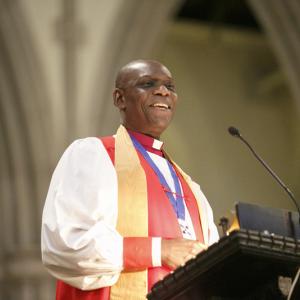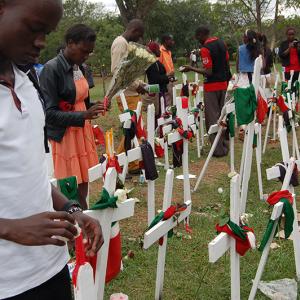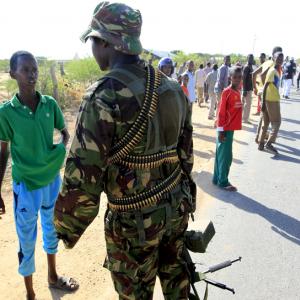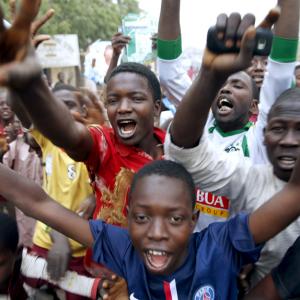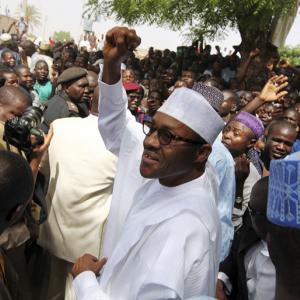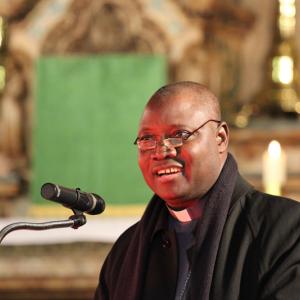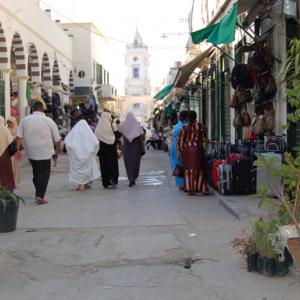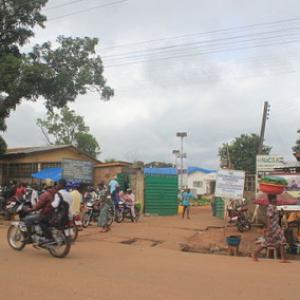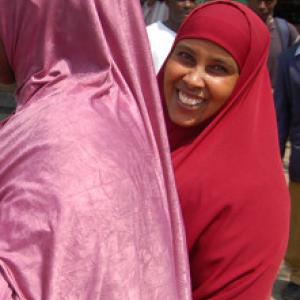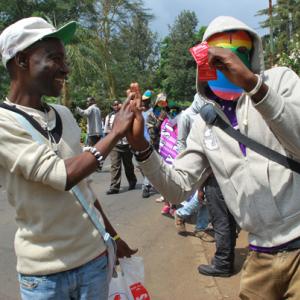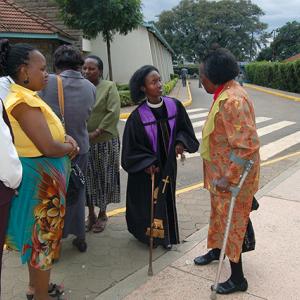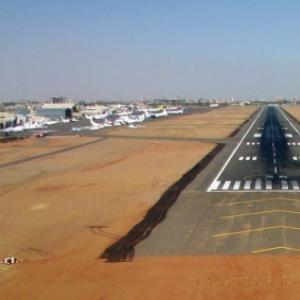Fredrick Nzwili is a journalist based in Nairobi, Kenya. For more than 15 years, he has written about religion, politics, peace and conflict, development, security, environment and wildlife. His articles have appeared in international media organizations among others; The Tablet, The Christian Science Monitor, The National Geographic and Kenyan local newspapers; The Standard and the People Daily.
Posts By This Author
Liberia’s United Methodists Keep Ban on Divorced Clergy Becoming Bishops
In the United States, United Methodists are fighting about whether to allow clergy to marry gay couples. In Liberia, divorce is on the line.
The United Methodist Church in Liberia recently voted to uphold a long-standing provision barring divorced clergy from running for the office of the bishop.
The church’s leaders say the ban brings moral credibility to the office and guides the conduct of those who want to be bishop.
Congo-Brazzaville Bans Muslim Women from Wearing Full-Face Veils, Citing Terrorism Prevention
Although Congo-Brazzaville has not witnessed violence like neighboring Cameroon, it is now the first country in the region to ban the veils.
In Cameroon, Nigeria’s Boko Haram insurgency has carried out deadly attacks in villages and towns. Female suicide bombers in veils have committed some of Boko Haram’s attacks.
“Muslim women can now only wear the full veil at home and in places of worship, but not in public places,” El Hadj Abdoulaye Djibril Bopaka, the head of Islamic Supreme Council of Congo-Brazzaville told Agence France-Presse.
LGBT Kenyans Gain the Right to Organize
Kenyan law bans homosexuality, and many clergy regularly preach against it as sin before God. But the ruling means that LGBT Kenyans will have an official platform from which to fight for their rights and freedoms.
“This is what we have been crying for,” said the Rev. Michael Kimindu, a former Anglican priest and now president of Other Sheep-Africa, a gay rights organization.
“It is the beginning of the journey towards freedom. We will now start asking: What happens when two people who are gay want to have a baby or want to go to church to marry?”
Anglican Communion’s New Secretary General Draws Praise from Africa, Condemnation Elsewhere
African Anglicans welcomed the appointment of a Nigerian bishop as the next secretary general of the 85 million-member Anglican Communion, even as others criticized the appointment because of his anti-gay comments.
Bishop Josiah Atkins Idowu-Fearon beat other applicants from Oceania, Asia, Europe, and the Americas and will assume the mostly ambassador-type post at a time when the worldwide communion remains estranged over homosexuality and same-sex marriages, especially in Africa.
“He is articulate and very well educated,” said Bishop Julius Kalu of Mombasa, Kenya, diocese.
“His position on traditional Anglicanism is very firm. This is good for us.”
Kalu said the appointment had come at the right time, when African Anglicans needed a bigger voice within the communion.
“The church is growing fastest here,” said Kalu.
Kenya Cracks Down on Al-Shabab Funding and Recruitment After Garissa Attack
Faced with a fierce enemy driven by Muslim extremist ideology, the government has cracked down on funding for al-Shabab, the Somali group that claimed responsibility for killing 148 mostly Christian students at Garissa University College a week ago.
This week, Kenya froze the accounts of 85 groups and individuals, including bus companies and Muslim rights organizations, allegedly linked to the group. It has closed down one hotel in Eastleigh, a neighborhood in the Nairobi commonly known as Little Mogadishu because of its large concentration of ethnic Somalis.
But the freeze on Muslims for Human Rights and Haki Africa, two nongovernmental organizations, raised questions, since they are known for their work on improving the lives of Kenyans and fighting for human rights of all citizens.
“I am amazed that these human rights organizations are believed to have been supporting terror,” said Sheikh Juma Ngao, the national chairman of the Kenya Muslim National Advisory Council.
“I think the government needs to provide some evidence.”
At Least 147 Killed, Hundreds Rescued in Kenyan University Attack that Targeted Christians
Somalia’s al-Shabab militants shot and killed more than 147 people, wounded dozens of others and held hundreds hostage April 2 at Garissa University College in northeastern Kenya.
Five hundred of the hostages were reportedly rescued as the day went on, but it was unclear immediately whether the standoff had ended and exactly what the death and injury toll was.
The gunmen reportedly arrived at the university at 5:30 a.m., killed the guards at the gate and began shooting indiscriminately before taking hundreds of students hostage. The Kenyan military tried to end the siege and rescued hundreds of the hostages during a shootout.
Most of the hostages are believed to be Christians.
Can a Muslim President Defeat Boko Haram? Nigerians Are Betting on It
A northern Nigeria Muslim leader who promised to pursue a nonreligious agenda as president will now have to deal with an Islamic terrorist insurgency that has wreaked chaos in the country’s north.
Muhammadu Buhari, 72, a former military ruler and a Muslim, beat incumbent Goodluck Jonathan, 57, a Christian from the country’s south, in a race held under the shadow of Boko Haram violence.
Not all Nigerians are happy with Buhari’s election, given his past human-rights record as president from January 1984 to August 1985. During that time, he imprisoned journalists and opposition activists without trial and executed drug traffickers by firing squad.
But Nigerians, both Christian and Muslim, hope he is better-suited to battle Boko Haram, despite being a Muslim himself.
Nigerian Christians May Back a Muslim Candidate in Upcoming Presidential Elections
Under the shadow of Boko Haram violence, Nigerians head to the polls March 28 to elect a president and a deputy in a vote observers say is critical for the country’s stability and economic progress.
In a twist that might have been difficult to predict, many Christians in Nigeria’s north are backing a Muslim candidate to lead their country away from the brink of violence and chaos.
Muhammadu Buhari, a Muslim from the north and the leader of the All Progressives Congress party, is challenging the leadership of incumbent President Goodluck Jonathan, a Christian from the south who heads the ruling People’s Democratic Party.
Some Nigerians fear that another term for Jonathan would mean institutionalization of corruption and emergence of more Muslim extremist groups in addition to Boko Haram.
And they are willing to pin their hopes on a Muslim candidate.
Nigerian Archbishop Calls for Unity Marches Following Boko Haram Massacres
Nigerian Roman Catholic Archbishop Ignatius Kaigama says his country needs a similar march to the one held in Paris on Jan. 11 to pay tribute to victims of Islamist militant attacks.
While 20 people were killed in the Paris rampage (including three terrorists), Boko Haram’s ongoing campaign of terror in Nigeria has left hundreds dead. Last week, as many as 2,000 were killed as Boko Haram militants took over the town of Baga in Borno state.
Kaigama said he wants the international community to show determination to stop the advance of militants, who are indiscriminately killing Christians and Muslims and bombing villages, towns, churches, and mosques.
“I hope even here a great demonstration of national unity will take place, to say no to the violence and find a solution to the problems plaguing Nigeria,” Kaigama told Fides, a Catholic news agency.
Islamic Militias Continue Spread Beyond the Middle East Into African Nations
An Islamist group has gained ground in the northeastern Libyan city of Benghazi, declaring it an Islamic territory and raising fears that radical Islamist militias may spread in the rest of Africa.
The declaration from Libya’s Ansar al-Sharia movement mirrors the rise of the Islamic State in northern Iraq and Syria. The two militant movements share similar goals.
The prospect of more fighting and the possible disintegration of Libya, the country where NATO allied forces helped topple strongman Moammar Gadhafi in October 2011, sent chills throughout the nation.
“I think this is a risky way to go,” said Sheikh Saliou Mbacke, a Senegalese Muslim leader who is the coordinator of Inter-Faith Action for Peace in Africa.
“It hinges on the failure of the governments, lack of democracy and poor and unequal distribution of resources,” added Saliou.
These latest actions reflect the growing influence of Islamists in Africa, where militants are challenging existing governments.
Is Ebola a Curse from God? Some African Christian Leaders Think So
As Western nations evacuate their citizens from West Africa’s growing Ebola outbreak, some Christian leaders have begun to speak of the virus as a curse from God.
On Friday, the World Health Organization declared the Ebola crisis ravaging the region an international health emergency. On the same day, Nigeria became the latest country in West Africa to declare the virus crisis a national emergency, the day after Spain evacuated a priest and a nun from Liberia to Madrid.
On Saturday, a Congolese nun died from Ebola in Monrovia, the capital of Liberia, the AP reported.
The outbreak started in December in Guinea, but was not discovered until March. It has since killed more than 1,000 people in Liberia, Guinea, and Sierra Leone.
“People are having different misconceptions that this is [a curse] from God,” said Bishop Sumoward Harris, now retired from the Lutheran Church in Liberia. “This is depending on how they are interpreting the Bible. But I don’t think God is angry and is issuing a punishment.”
In Liberia, more than 100 Christian leaders meeting in early August declared that God was angry and Ebola a plague.
Some Nigerians Call for Banning the Hijab to Prevent Female Suicide Bombers
In northern Nigeria, mounting fears of militant female suicide bombers have raised calls to ban the hijab, or the veil that covers the head, chest and, in some cases, the entire body.
Last week, four women believed to be members of the Islamic militant group Boko Haram carried out attacks in Kano, a city in northern Nigeria. Men belonging to the group have taken to wearing the hijab, too, according to reports.
On July 27, a female suicide bomber detonated a bomb outside a Roman Catholic church in Kano, killing four people and injuring 70. Around the same time, security agencies arrested two girls aged 10 and 18 with explosive belts under their hijabs.
“We have this worrying situation where the bombers are turning out to be girls dressed in the hijab,” Roman Catholic Bishop John Niyiring of Kano said.
Banning the hijab is crucial to curbing the trend, said Emmanuel Akubor, a historian at Obafemi Awolowo University in Ile-Ife in western Nigeria.
“The best thing for now is to place a temporary ban on hijab, not for religious, but security reasons,” he told News Agency of Nigeria.
But Niyiring said he thinks such a ban would be resisted.
Uganda's Anglican Leader Doubles Down on Anti-gay Law
Uganda’s top Anglican leader criticized the constitutional court for striking down the country’s controversial anti-gay law on a technicality, saying the law is still needed to protect children and families from Western-imported homosexuality.
A five-judge panel on Friday declared the Anti-Homosexuality Act, 2014, null and void since it was passed by parliament without the required quorum. Dismissing the law on a technicality maintains the possibility that it could be revived in a different form.
The law punishes homosexual acts with life imprisonment. President Yoweri Museveni signed the measure in February, drawing harsh criticism from Western nations and cuts in foreign aid.
Anglican Archbishop Stanley Ntagali called the decision a disappointment for the Church of Uganda, religious leaders and many Ugandans.
“The ‘court of public opinion’ has clearly indicated its support for the Act, and we urge Parliament to consider voting again on the Bill with the proper quorum in place,” Ntagali said on Monday.
Kenya's Catholic Bishops Sued After Canceling Lease for Muslim-run Restaurant
The Kenya Conference of Catholic Bishops is facing a lawsuit over the cancellation of a rental contract for a restaurant operated by a Somali Muslim.
Al-Yusra Restaurant Ltd. had signed a six-year lease starting in 2013 to operate a restaurant in a section of Waumini House where the bishops’ conference is based. Baakai Maalim, a Somali Muslim, is a director for the company.
Church of England Approves Women Bishops in Historic Vote
After 20 years of turmoil and angry debate, on Monday the General Synod of the Church of England said “yes” to women bishops.
The first could be named by the end of the year with the appointment of at least three additional women sometime in 2015, say senior church officials.
The General Synod is the three-tier governing body of the Church of England and it is made up of bishops, clergy, and laity.
At a meeting in York, the General Synod gave final approval to legislation introducing the changes by the required two-thirds majority.
Overall 351 members of the 433 Synod voted in favor of the measure.
In Kenya, a Pastor with Disabilities Breaks Barriers for Others
On a Sunday at the Presbyterian church in the Bahati neighborhood, a young woman haltingly approaches the pulpit with a walking cane in one hand and a Bible in the other. Somewhere in her pocket is a mobile phone, which she uses to send out at least 400 Bible quotes a day to Christians across the city.
The Rev. Dawn Gikandi, 31, is a rarity here — a pastor who is a woman, a theologian, a social media devotee, and a disabled person in a country that stigmatizes people who are physically impaired.
In April, the Presbyterian Church of East Africa ordained Gikandi and sent her to her first post, Bahati Martyrs’ Church, where she and another pastor care for more than 4,000 congregants.
Detained on Charges of Forgery, Meriam Ibrahim Is Not Yet Free
A Sudanese Christian doctor freed from death row on charges of apostasy Monday is not yet free after authorities detained her at a Khartoum airport.
She was apprehended along with her husband, Daniel Bicensio Wani, an American citizen of South Sudanese origin, and their two children — 20-month-old son Martin and a 1-month-old daughter.
Kenya's Religious Leaders Semand Government Response to Deadly Terror Attack
Christian and Muslim leaders united Tuesday to demand government action after a deadly terror attack in Kenya’s coastal region.
The gunmen held the town hostage for more than four hours, burning houses, hotels, and banks, and even attacking the local police station.
The Islamic militant group al-Shabaab said it executed the attack as revenge for the Kenyan army’s presence in Somalia, the killing of Muslim scholars in the coastal region and the oppression of Muslims.
The government has since said this was not an al-Shabaab attack but was carried out by a gang paid by politicians.
Christians Condemn Death Penalty for Sudanese Doctor Accused of Apostasy
Sudanese Christians have condemned the sentencing of a Christian woman to death by hanging after she married a Christian man.
Meriam Yehya Ibrahim, 27, refused to recant her Christian faith as ordered by the court.
A doctor who is eight months pregnant and currently in detention with her 20-month-old son, Ibrahim was charged with adultery last year. Recently, the court added an apostasy charge when she declared her Christian faith in court.
“This is very disturbing,” said Roman Catholic Auxiliary Bishop Daniel Adwok of Khartoum.
Nigerian Christians Begin Three-day Fast After Schoolgirls Kidnapped
Christians began a three-day prayer and fasting period after Islamist Boko Haram militants kidnapped hundreds of schoolgirls in Nigeria and desperate parents joined the search in a remote forest.
The girls were abducted last week while at school in the Chibok area of Borno State. Initial reports said about 200 were kidnapped, but government officials lowered the figure to 130. On Monday, school officials said 234 were abducted and 40 girls had managed to escape.
“We know no religion [that] prescribes abduction or infliction of pain as a way of devotion,” said the Rev. Titus Pona, an official with the Christian Association of Nigeria. “We are calling on them to sheathe their arms and pursue their case in dialogue with the government.”
